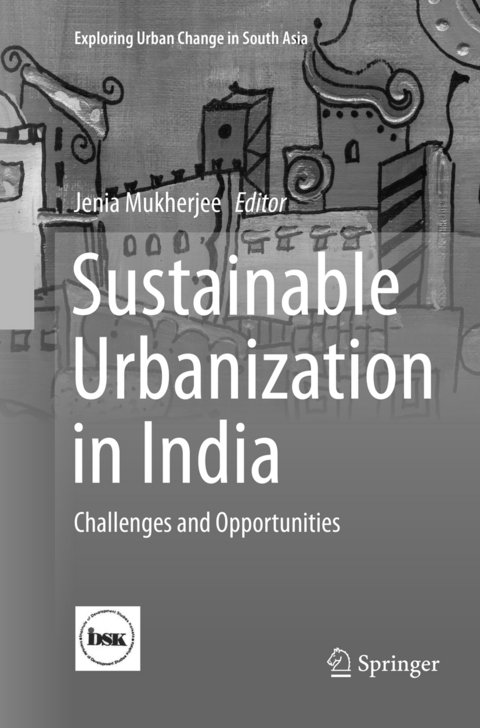
Sustainable Urbanization in India
Springer Verlag, Singapore
978-981-13-5270-6 (ISBN)
The Indian urban scenario is extremely complex and diverse, and solutions laid out in official and non‐official documents tend to miss these complexities. This volume includes innovative research acrossdifferent parts of India, identifying city‐specific sources of unsustainability and challenges along with strategies and potentials that would make the process of urban transition both sustainable and equitable. Complex explorations of non‐linear, bottom‐up, multisectoral process‐based local urban contexts across north, south, east and west Indian cities in this volume critique a general acceptance of the universalized concept of ‘sustainable urbanization’ and suggest ways that might be important for transcending inclusive theories to form practical policy-based recommendations and actions.
Jenia Mukherjee is Assistant Professor at the Department of Humanities and Social Sciences, Indian Institute of Technology Kharagpur. Her research interests include urban sustainability, environmental history, political ecology and development studies. In 2013, she was awarded the World Social Science Fellowship on Sustainable Urbanization by the International Social Science Council. She has published papers and chapters in peer-reviewed journals and edited volumes and conducted international projects on urban environmental issues.
Chapter 1. Indian Urban Trajectories: Addressing ‘Sustainability’ across Micro-political Settings Jenia Mukherjee.- Chapter 2. Towards Sustainable Cities in India Annapurna Shaw. Section 1: Governing Investments and Infrastructures.- Chapter 3. Structural Limits to Equitable Urbanization Achin Chakraborty.-Chapter 4. Alternative Provision of Tenure Security and Rights to the Urban Poor: A Case Study from Ahmedabad Atanu Chatterjee.- Chapter 5. State, Governance and Urban Poor: Insights from Visakhapatnam City Debapriya Ganguly.- Chapter 6. Performing Governance in Urban Patna Sheema Fatima.- Chapter 7. Sustainability of Urban Fringe Development and Management in NCT – Delhi: A Case Study Ramkrishna Nallathiga, Suhani Taneja, Anusha Gupta & Bitul Gangal. Section 2: Managing Wastes and Wetlands.- Chapter 8. Evaluating Municipal Solid Waste Management inIndian Cities: A Comparative Assessment of Three Metros in South India Sajith Shaik & Avinash Y. Kumar.- Chapter 9. Electronic Waste in Urban India: A Major Sustainability Challenge Anwesha Borthakur.- Chapter 10. How Expensive is the Decay of East Kolkata Wetlands? An Estimation of Opportunity Cost for Kolkata Debanjana Dey & Sarmila Banerjee.- Chapter 11. Urban Ecologies in Transition: Contestations and Negotiations surrounding Waste in Mumbai Sneha Sharma & D. Parthasarathy. Section 3: Exploring Ecologies and Environmentalisms.-Chapter 12. Sustainability or (Sustain)ability? Environmentalism and Shades of Power in a Metropolis Amit Jain.- Chapter 13. Gentrification and Rising Urban Aspirations in the Inner City: Redefining Urbanism in Mumbai Dwiparna Chatterjee & D. Parthasarathy.- Chapter 14. Communities in a ‘Protected’ Urban Space and Conservation Politics in Mumbai’s Sanjay Gandhi National Park Amrita Sen & Sarmistha Pattanaik.- Chapter 15. Urban at the Edges: Mumbai’s Coastline Urbanisms Hemant Kumar Chouhan, D. Parthasarathy & Sarmistha Pattanaik.- Chapter 16. Contested Urban Waterscape of Udaipur Neha Singh, D. Parthasarathy & N.C. Narayanan.
| Erscheinungsdatum | 20.12.2018 |
|---|---|
| Reihe/Serie | Exploring Urban Change in South Asia |
| Zusatzinfo | 40 Illustrations, color; 5 Illustrations, black and white; XXV, 317 p. 45 illus., 40 illus. in color. |
| Verlagsort | Singapore |
| Sprache | englisch |
| Maße | 155 x 235 mm |
| Themenwelt | Naturwissenschaften ► Geowissenschaften ► Geografie / Kartografie |
| Sozialwissenschaften ► Soziologie ► Spezielle Soziologien | |
| Wirtschaft ► Volkswirtschaftslehre | |
| ISBN-10 | 981-13-5270-4 / 9811352704 |
| ISBN-13 | 978-981-13-5270-6 / 9789811352706 |
| Zustand | Neuware |
| Informationen gemäß Produktsicherheitsverordnung (GPSR) | |
| Haben Sie eine Frage zum Produkt? |
aus dem Bereich


